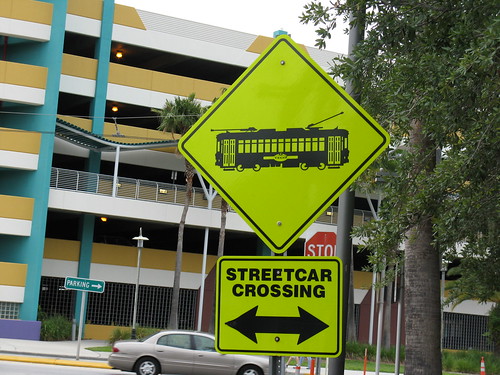As the U.S. economy weakens and gas prices rise, urban areas — and some suburban regions — have noticed a steady and substantial increase in mass transit ridership figures. Now, as Think Progress’ Matthew Yglesias noted earlier this week, a crowd swell of fiscal support for transit is building in Congress.
In another left-leaning forum, The American Prospect takes a look at how conservatives and conservative ideology should support urban infrastructure investment. Wrote Dana Goldstein:
Policies in favor of dense development shouldn’t be viewed on a left-right spectrum and certainly needn’t be filtered through culture-war rhetoric… In fact, one doesn’t have to be concerned about climate change at all in order to support such policies; values of fiscal conservatism and localism, both key to Republican ideology, can be better realized through population-dense development than through sprawl.
Tom Darden, a developer of urban and close-in suburban properties, said Wednesday, “I’m a Republican and have been my whole life. I consider myself a very conservative person. But it never made sense to me why we would tax ordinary people in order to subsidize this form of development, sprawl.” Darden told the story of a road-paving project approved by North Carolina when he served on the state’s transportation board. A dirt road that handled just five trips per day was paved at taxpayer expense, with money that could have gone toward mass transit benefiting millions of people.
“Those were driveways, in my view, not roads,” Darden said.
More common sense came from Congressman John Mica of Florida, the ranking Republican on the House Transportation and Infrastructure Committee. “I can’t just continue to pave over every metro area,” he said. “Our goal is to reduce the negative impact on the environment and also reduce our dependence on energy.”
Perhaps the tide is starting to turn in transit’s favor. Perhaps New York’s transit infrastructure, short on cash, can look to the future for more government funding and fewer fare hikes. At least, we have reason to hope.
For now, though, work continues ad infinitum during the weekends in New York. Click through for the weekend service changes.

 On Friday afternoon — long a favored time of the Bush Administration to drop bad news — came word that the federal Highway Trust Fund is
On Friday afternoon — long a favored time of the Bush Administration to drop bad news — came word that the federal Highway Trust Fund is  Rare are the days when I, as a blogger, venture into the world of partisan politics. Those grounds are covered by people with more time for blogger than I have, and I like to keep my focus on news and views from the subway. Sure, most regular readers have probably picked up my liberal leanings, but in New York, we operate in our own political world.
Rare are the days when I, as a blogger, venture into the world of partisan politics. Those grounds are covered by people with more time for blogger than I have, and I like to keep my focus on news and views from the subway. Sure, most regular readers have probably picked up my liberal leanings, but in New York, we operate in our own political world.
